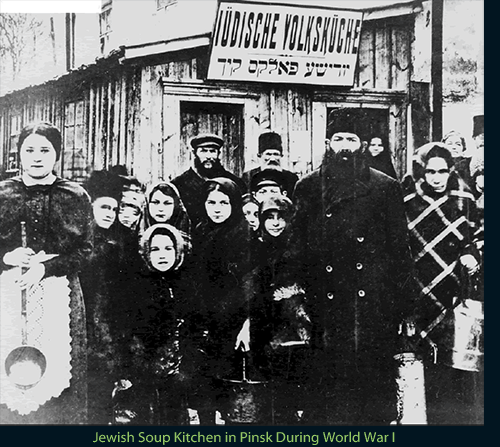Nine Generations
Pinsk: family history
Pinsk is a city of 130,000 in present-day Belarus. It lies near the confluence of the Pina and Pripyat rivers. At the turn of the twentieth century, when the Glotzers, Kupermans and Eisenbergs lived there, they were part of a substantial Jewish population. The town carried on considerable trade. The Pina River is navigable and connects Pinsk to the fertile regions in the basin of the Dnieper, and, via the Bug Canal, with Poland and Prussia. The Oginsky Canal connected it with the basin of the Niemen. Pottery, leather, oil, soap and beer were the chief products of the local industries. One of the larger business enterprises in Pinsk was the Bassevitch family's brewery and liquor store.
My great grandmother, Rochel Eisenberg, worked in the Bassevitch liquor store as a young woman; after her marriage to Ephraim Kuperman they became the managers of the brewery and, according to Aunt Hannah, a house was built for them on the grounds. My grandfather, Chonya Glotzer, first married Hannah Eisenberg, Rochel Eisenberg's sister; after Hannah's early death he married his niece-in-law, Chinka Kuperman. Chonya Glotzer and his brother Yitzhak had businesses on the river, among them a bath house. In Pinsk he was known as "Chonya the bath man." They also rented boats and ice skates. Chonya had had four children with his first wife and added five more with Chinka Kuperman. The youngest of the latter was my mother, Paula Glotzer. The family's migration to the United States began with Israel and Ida Kuperman who left Pinsk in March, 1905, a year of considerable political turmoil in the Russian Empire. The remainder of the Kupermans left Pinsk for the United States within the next year and a half. The family name was changed to Cooper shortly after they had all arrived. Chinka Glotzer, at the age of 17, was the first of Chonya Glotzer's children to come to the United States. She traveled by herself aboard the S.S. Grosser Kurfürst in 1908. Harry Glotzer, one of Chonya's brothers, had preceded Chinka to the United States, having arrived in New York in 1904.

World War I began in Europe in August, 1914. By 1915, Pinsk was occupied by the German army. Unfortunately for the Pinskers, they found themselves nearly at the tip of a salient which was surrounded on three sides by the Russian lines. The Germans, short of food and supplies themselves during World War I, did not make effective provision for the residents. Many starved. As it happens, Jews were not specially victimized. The Germans regarded the Russians as the principal enemy. I was once told, I think by my mother, that her immediate family was saved by the kindness of a German army physician who brought them food. He is said to have been courting one of her older sisters.
The war made a deep impression on Mother. When she sailed to the United States in 1920 there were rolls on the dinner table; at every meal she would take one or two back to her cabin, just in case — and at the end of the voyage she was very much embarrassed by having a roomful of stale rolls. The war came back in other ways, too. There were recurrent bouts of malaria in her youth, probably a souvenir of the Pripyat Marshes. In 1971, Mother came to visit us in Ellensburg. One evening we were sitting at the dinner table when she suddenly sat up and exclaimed, "Guns!" Ellensburg is about thirty miles from the Yakima Firing Center where the Army trains tank crews and artillerists. One doesn't exactly hear it, but occasionally one feels a kind of rumble or mutter from far off. Mother remembered the sound of artillery exactly, after more than fifty years.
Although the war ended in 1918, chaos continued in Eastern Europe. In particular, the Polish-Soviet War, which broke out in February, 1919, brought continuing destruction and hardship to Pinsk. In the midst of this the family somehow managed to arrange for the four remaining Glotzer girls - Faigl, Raisel, Odel and my mother - to emigrate to the United States. They sailed aboard the S.S. Lapland from Antwerp, arriving in the United States on July 15, 1920. On the ship's manifest Louis Cantor, Chinka's husband, is listed as their American contact.
In that same year, Pinsk became part of Poland; this was to last until 1939 when Poland was divided between the Soviet Union and Germany. Pinsk became part of the Soviet Union, but in 1941, when Germany attacked the U.S.S.R., the city was again occupied by the Germans. At this point 30,000 residents — about 90% of the city's population — were Jewish. Ten thousand of these people were shot in August, 1941 during the first three days of the German occupation. Little is definitely known about the fate of our family. Moshe Glotzer and his wife are known to have been publicly hanged towards the beginning of the German occupation, apparently for being in possession of furs in violation of some German regulation. A gentile neighbor is said to have reported them to the Germans. That much is documented. Whatever else happened, neither my grandfather, nor my uncles Moshe, Yankl and Itzhak, nor any of their families, survived the war. Most of the Pinskers who lived through the initial onslaught were killed between 29 and 31 October 1942.
Pinsk lies 175 miles west-northwest of Chernobyl. As a result of the 1986 nuclear disaster, Pinsk received a heavy dose of radiation. Cancer rates are said to be up and housing costs down. In 1991, with the dissolution of the Soviet Union, Pinsk became part of Belarus.